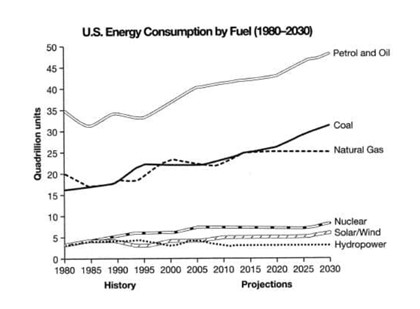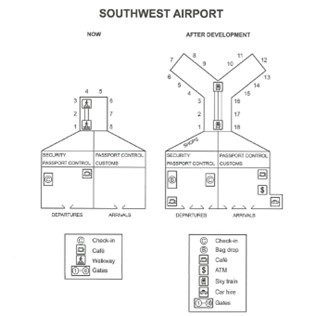ข้อมูล IELTS Writing Academic
ข้อสอบ IELTS Writing ออกสอบ 2 ข้อ ใช้เวลาทำข้อสอบ 60 นาที บทความนี้รวบรวมสรุปข้อมูลการสอบ IELTS Writing Academic, คำศัพท์ IELTS, เกณฑ์การให้คะแนน และเทคการทำข้อสอบให้ได้ Band 7 ขึ้นไปเพื่อยื่นเรียนต่อมหาวิทยาลัย
เนื้อหาในบทความนี้:
- ข้อมูล IELTS Writing Task 1 Academic
- เกณฑ์คะแนน IELTS Task 1
- ตัวอย่างข้อสอบ Writing Task 1
- ข้อมูล IELTS Writing Task 2
- เกณฑ์คะแนน IELTS Task 2
- ตัวอย่างข้อสอบ Writing Task 2
IELTS Writing Task 1 Academic
ข้อสอบ IELTS Writing Task 1 กำหนดให้เขียนขั้นต่ำ 150 คำ ควรใช้เวลา 20 นาที (จากทั้งหมด 60 นาที) แต่นักเรียนสามารถเลือกใช้เวลาเขียนพาร์ทไหนมากกว่าก็ได้ภายในเวลา 1 ชั่วโมง
ข้อสอบกำหนดให้เขียนอธิบายข้อมูล ตัวเลข กราฟ แผนที่ หรือกระบวนการทำงาน
- Line chart
- Bar chart
- Pie chart
- Mixed chart / Table
- Map
- Process
เกณฑ์การให้คะแนน IELTS Writing Task 1
คะแนน IELTS Writing Task 1 พิจารณาจาก
- Task achievement (25%) เขียนอธิบายข้อมูลที่สำคัญ
- Coherence and cohesion (25%) เขียนจัดอันดับประโยคก่อนหลังให้เข้าใจง่าย
- Vocabulary (25%) ใช้คำศัพท์ทางการ หลากหลาย และถูกต้อง
- Grammar (25%) ใช้ไวยากรณ์ถูกต้อง เขียนประโยคซับซ้อนได้
ตัวอย่างคำถาม ข้อสอบ Writing Task 1
Line chart

Bar chart

Map

IELTS Writing Task 2 Academic
ข้อสอบ IELTS Writing Task 2 กำหนดให้เขียนขั้นต่ำ 250 คำ ควรใช้เวลา 40 นาที (จากทั้งหมด 60 นาที) แต่นักเรียนสามารถเลือกบริหารเวลาได้เองระหว่าง Task 1 และ Task 2
ข้อสอบกำหนดให้เขียนแสดงความคิดเห็นข้อความที่โจทย์กำหนด ให้เหตุผล และตัวอย่างประกอบ
- Agree or disagree (Opinion)
- Discussion
- Advantage and disadvantage
- Problems and solutions
- Direct question
เกณฑ์การให้คะแนน IELTS Writing Task 2
คะแนน IELTS Writing Task 2 พิจารณาจาก
- Task achievement (25%) เขียนตอบโจทย์ อธิบาย และให้ตัวอย่างประกอบ
- Coherence and cohesion (25%) เนื้อหามีความสอดคล้องกัน
- Vocabulary (25%) ใช้คำศัพท์ทางการ หลากหลาย และถูกต้อง
- Grammar (25%) ใช้ไวยากรณ์ ประโยคซับซ้อน และถูกต้อง
ตัวอย่างคำถาม ข้อสอบ Writing Task 2
Agree or disagree (Opinion Essays)
- Governments should spend money on railways rather than roads. Do you agree or disagree with this opinion?
- Some people say that music is a good way of bringing people of different cultures and ages together. Do you agree or disagree with this statement?
- In the future, nobody will buy printed newspapers or books because they will be able to read everything they want online without paying. To what extent do you agree or disagree with this statement?
Discussion Essays
- Many people think that the government should spend a large sum of money on building railway lines for trains. Others believe that the money should be spent on the education system. Discuss both views and provide your opinion.
- Some people believe that professionals, such as doctors and engineers, should be required to work in the country where they were trained. Others believe they should have a choice to work in another country if they wish. Discuss both views and provide your opinion.
- Some people think that it is the government’s responsibility to save the environment. Others think that it is everyone’s responsibility. Discuss both these views and give your own opinion.
Advantage and disadvantage
- It is important for people to take risks, both in their professional lives and their personal lives. Do you think the advantages of taking risks outweigh the disadvantages?
- In the future, all cars, buses and trucks will be driverless. The only people travelling inside these vehicles will be passengers. Do you think the advantages of driverless vehicles outweight the disadvantages?
- In some countries, owning a home rather than renting one is very important for people. Do you think the advantages of owning a home outweigh the disadvantages?
Problem and solution
- Rich countries are getting richer while poor countries are getting poorer. What is the cause of this? What could be done to solve this problem?
- In many countries, an increasing number of overweight people are putting a strain on the health care system. What is the cause of this? What could be done to solve this problem?
Direct question
- Nowadays many people choose to be self-employed, rather than to work for a company or organisation. Why might this be the case? What could be the disadvantages of being self-employed?
- Some people claim that not enough of the waste from homes is recycled. They say that the only way to increase recycling is for governments to make it a legal requirement. To what extent do you think laws are needed to make people recycle more of their waste?